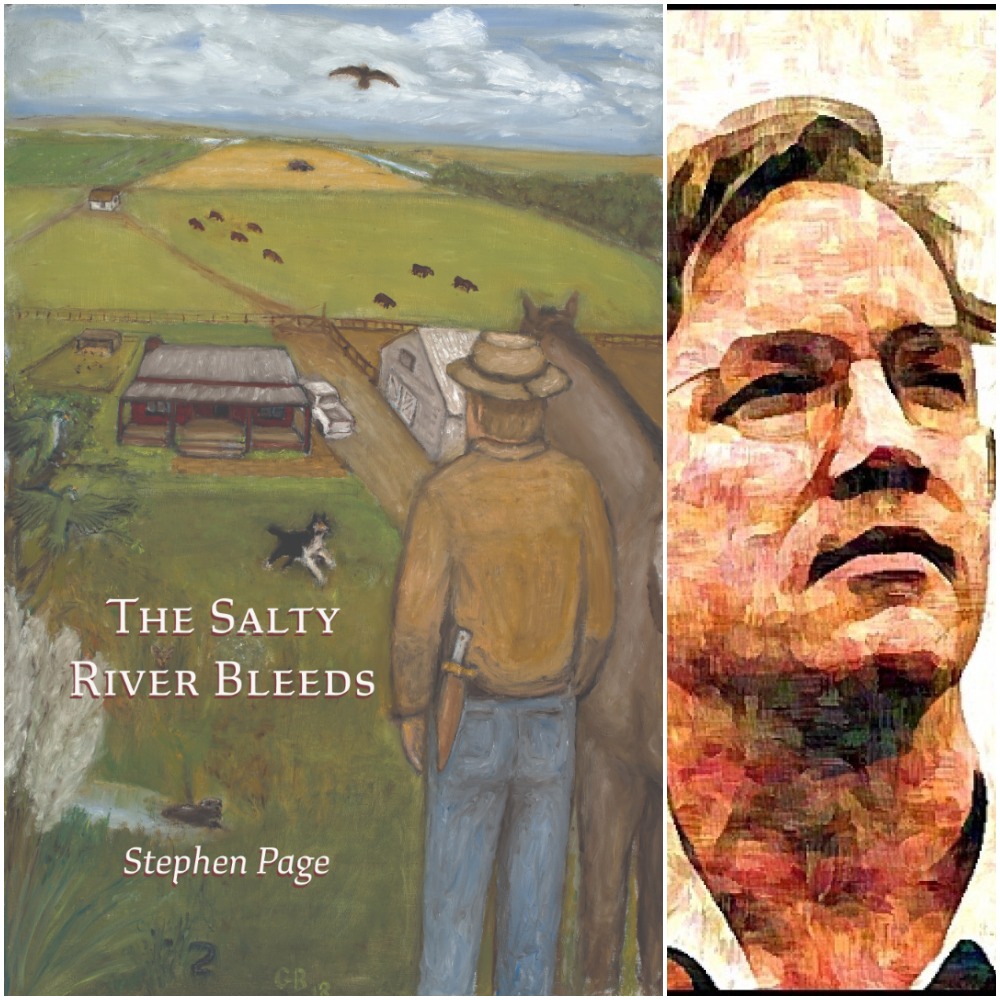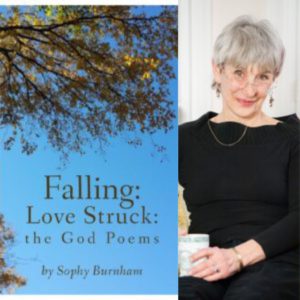The Salty River Bleeds is a juicy tale in verse that draws us into the teeming world of a large Argentinian ranch. This world is populated by herds of horses and cows, nefarious ranch hands, foxes, bees, bats, parrots, carnivorous ants, Andean flamingoes, cattle rustlers, horse thieves, to name but a few of its many denizens. The narrative reveals the complicated web of woes in the life of a land manager, the tyranny of weather patterns, and one man’s battle against the encroachment of pesticides. In this world, nature’s staggering beauty and naked brutality are constantly in evidence. A stallion “learns the phases of grass.” Trucks struggle through “the butter of mud.” Cows can explode with bloat, and rain that the narrator prays will be called down from the sky by the croaking of tree frogs can make or break you. As its title suggests, The Salty River Bleeds is packed with the drama of birth, death and eternal conflict.
–Amy Gerstler, author of Bitter Angel
The Salty River Bleeds is ambitious in its scope and its execution, with a relevance to contemporary environmental issues. Stephen Page deftly combines poetry, prose, and letters…and relies on highly refined, compressed imagistic language and strong character development to tell his tale.
–Jim Daniels, author of Places Everyone
The Salty River Bleeds is a continuation of the story of Jonathan and Teresa that Stephen Page began in A Ranch Bordering the Salty River. These poems speak of the visceral life of farming on a fictional ranch in Argentina. Page’s narrative is a journey of perseverance through a physical and psychological wilderness where loveliness and brutality abide together. Here, the likes of a raw and wet “afterbirth slopped into a steamy pile” leads to the mother straining to “stare at her calf until breath raised its ribs.” Page walks us through vulture-ravaged carcasses into pastures and wood and marsh; walks us into the solace of bees, mockingbirds and “a flock of black ibis” that “lift/and cloud away.” This is poetry told with an unflinching, yet reverent eye. –Carolyn Welch, author of The Garden of Fragile Beings
The Salty River Bleeds is equal parts parable and fable, examining humankind’s destructive and self-defeating tendencies, particularly with regard to caring for the land human beings and animals rely on. Here where the Salty River bleeds, you will find that Myth swims, Old Man lingers on your peripheral vision only to disappear, and Black Dog follows you into the mythic Wood. On the ranch, you will encounter Tattler, Excuse Maker, and Bad Guy, archetypal figures standing in for all those whose motives are to be questioned. By turns imaginative and inventive, gritty and grisly, gorgeous and ephemeral, this is a book that will linger long after you have finished. There are inherent truths laid bare here that we would all do well to pay heed.
–Cati Porter, author of Seven Floors Up
In Stephen Page’s The Salty River Bleeds, the spiritual journey of Jonathan continues from A Ranch Bordering the Salty River. Looking for a story to explain his life, Jonathan meditates on nature, in particular Wood, a place of testing, a place of mysteries ripe to be discovered, and the people who work his land without reverence. With an observant eye for detail, Page brings together striking images of the elements of earth and human life that become both obstacles to and medium through which the speaker of these poems understands his world.
–Caroline Malone, author of Dark Roots
Stephen Page’s The Salty River Bleeds is a pastoral and violent account of ranch life. His poetic collection blends agricultural and rustic contention with eco-rural insight and directness. His delivery is candid and un-floral, thus bestowing the music of his perception an energy of seized quotidian acuity. These poems dare the readers to care about the animals, the daily activities of surviving rurally, and the grammar of the land exploited by genetic modified commerce and industrialization. The work invites the geography of natural breeding life to marry the perennial charm of ranch hardship. There, in his work, exists the sensual preservation of humanity, but also diurnal desires. Page’s bucolic poems “may take you to an unlit alley at night” or “sound like buckets of water being poured on the corrugated roof.” Regardless of the rustic tempo his work imbues you, through Page’s percipient, omniscient eyes, we see and hear everything he observes and feels and yearns. Like sheep hides “salted in the transit room” – Page’s work is designed to ambush us, not with the forcefulness or melancholy of existence, but, as seen here, with the authoritative authenticity of his persistent fervor.
–Vi Khi Nao, author of Fish in Exile
Stephen Page’s The Salty River Bleeds is a collection of connections. Page explores relationships, ethics, and economy through environmental images that ooze the intricacies of farm life. His thoughtful, sensory-rich prose and varied expressions of poetic form delve into the inner workings of losses and discoveries.
–Savannah Slone, Author of Hearing the Underwater
Stephen Page is a true poetic chronicler of the complex business of ranching, that mythic journey. The Salty River Bleeds is iconic storytelling; a hybrid of poems, letters, and prose. Filled with rich images, “wood walks” and myth finding. “Life takes you into some unplanned territory.” Follow Page and we are “wading into wheat” and “working all week to save the corn.” The tractor is broken, the fences need mending, but still we are watching and waiting for Old Man walking by the side of the road, the one who never stops. Follow Page into his dreamscape of visceral reality to satisfy a curiosity, an unspoken desire.
–Elaine Fletcher Chapman, author of Hunger for Salt
In The Salty River Bleeds, Stephen Page poetically and unapologetically reveals the real, harsh truths of running a ranch in Argentina. Johnathan’s daily stressors, created by unreliable employees, weather, and Teresa’s greedy son, Damien, find us anxiously watching him “run across pastures with my sword / Raised, looking for someone to decapitate.” Page softens Johnathan’s persona by peppering the pages with love, beauty, mate, and the whimsy of Wood and Myth as “A wooddove pops / its wings as it departs eucalypti mist auraed by / a vanilla sunrise.” The juxtaposition of the hard and the soft leaves us with a longing to know how Jonathan and Teresa’s story ends. The Fauna of this collection proves to be a mesmerizing sequel to the Flora of the initial introduction of Johnathan and Teresa in his earlier collection, A Ranch Bordering the Salty River.
–Laurie Higi, author of The Universe of Little Beaver Lake






Aria Ligi –
Page’s collection, Salty River Bleeds, is a two-part parable, one of the lives of Jonathon and Teresa and the other of his ranch, its inhabitants, the environ consisting of his cows, sheep, ibis and such and their struggle against the exteriors (man encroaching on them all). Yet, it is also, as he pictures so beautifully, mirrored with Old Man, who through the simple the challenge of living day to day, is a metaphor for it all. Pages’ work embodies very Campbellesque qualities of the myth told within the confines of free verse, epistles, and alternatively spiced with rhyme. Page is not only a mythmaker he is rancher poet-activist who is wise enough to question his place within the tale, that of hunter and farmer, while portraying in stark terms the cost to those around him from his livestock to the earth, air, those who would shepherd it, and those who would seek to profit from it. This is a fascinating read because it does not shy away from depicting the most hideous of things, such as the roof of a truck slicing through a man’s neck, nor does it distance itself from the beauty that is all around him. Yet, Page does not leave it there, because at the end he returns us to his quiet pondering, that of Teresa and Old Man, leaving us with the mirror image for us all and the unsaid question, are we all not walking that same road, and in that are we not all- one and the same?
Rustin Larson –
The Salty River Bleeds by Stephen Page
This is genuine good writing. This is not a walk in the gew gaw shop of strained emotions and overreaching images. This is writing carved from the raw material of actual living and work.There are narratives and there are lyrics with each word penetrating its subject like the point of a knife. There are good guys and there are bad guys and they are all exposed with a language that flies straight to the truth. “How long did you take to flay those sheep whose skins lie so limply wet in your truck?” Pay attention. This guy, Stephen Page, is going to make some noise in the shining cathedral of poetry.
–Rustin Larson, author of Library Rain